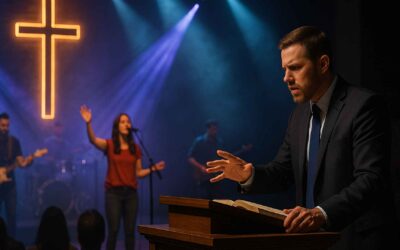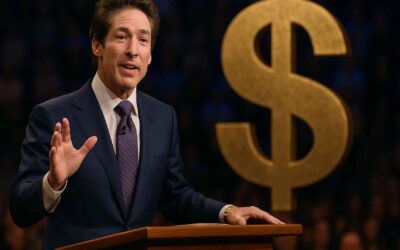There is a quiet crisis eating away at the spiritual foundation of the church in America. It doesn’t make headlines. It’s not dramatic. There are no celebrity pastors falling from grace here, no culture war flashpoints, no moral panics that fuel social media outrage. This crisis is more subtle—but no less dangerous. It hides behind affirmations of faith and pious-sounding phrases. It lurks behind pulpit and pew alike. It is the scandal of biblical illiteracy. And it is our problem.
As Dr. R. Albert Mohler Jr. noted in his seminal article, The Scandal of Biblical Illiteracy: It’s Our Problem, this is not a peripheral issue—it is central to the life and health of the church. Mohler wrote in 2016 what remains tragically true nearly a decade later: “Americans revere the Bible—but by and large, they don’t read it. And because they don’t read it, they have become a nation of biblical illiterates.” For those of us in the conservative, Reformed tradition—particularly those within Episcopal Baptist churches like our own—this crisis must awaken a deep sense of grief and urgency. We are people of the Word, or we are nothing.
What we are witnessing in this generation is not merely a decline in Bible reading. It is a breakdown in biblical authority. The foundation of truth—objective, God-breathed, eternal—is being eroded not by aggressive secularism alone, but by Christian neglect. We are quick to declare sola Scriptura with our lips, but slow to open the Scriptures with our eyes and hearts.
Lip Service and Lost Knowledge
Walk into any typical evangelical or Baptist church and ask the members, “Do you believe the Bible is God’s Word?” Nearly all will nod vigorously. “Of course,” they’ll say. “Absolutely.” Ask them, “Do you believe the Bible is true and authoritative in all it teaches?” Once again, nods. Affirmation. Agreement.
But ask a more troubling question: “How often do you read it?” Ask, “Can you summarize the story of Scripture, from Genesis to Revelation?” Or “Can you explain justification by faith alone, or the nature of the covenants, or what Jesus meant when He said, ‘I came not to bring peace but a sword’?” Ask what the book of Romans is about. Ask what happened at Mount Sinai, or how the temple points to Christ, or what the prophetic office of Christ means.
Suddenly, silence.
This is not a failure of intelligence. It is a failure of discipleship. It is a spiritual crisis wrought by a generation that has confused proximity with possession. Just because the Bible is on your phone or in your church pew does not mean it has made its home in your heart. We live in an age of unmatched access to the Word of God—apps, podcasts, online sermons, printed Bibles in every translation imaginable—and yet never has the church been more biblically impoverished.
According to the studies Mohler cites, the statistics are staggering: most professing Christians cannot name the four Gospels. A shocking number believe that the epistles were written by the apostles’ wives. Many think that the Sermon on the Mount was preached by Billy Graham. A majority of self-identified evangelical Christians cannot identify basic theological truths or articulate essential doctrines. The Bible is known in fragments, reduced to inspirational memes, misquoted clichés, or prooftexts for personal opinion.
And yet we wonder why the church is weak.
Why It Matters: The Bible Is Not Optional
This is not merely a matter of preference or maturity. It is not about whether someone is more intellectual or analytical. This is about obedience. God has not suggested that His people read and know His Word—He has commanded it.
In Deuteronomy 6:6–7, Moses speaks to the people of God before they enter the promised land: “And these words that I command you today shall be on your heart. You shall teach them diligently to your children, and shall talk of them when you sit in your house, and when you walk by the way…” The Word was not to be occasional. It was to be constant. It was to be meditated upon, internalized, repeated, passed down generationally, and obeyed.
Psalm 1 tells us that the blessed man “delights in the law of the Lord, and on his law he meditates day and night.” He is not tossed by winds of cultural change or emotional instability. He is rooted. Why? Because he is saturated in Scripture.
The Apostle Paul, writing to Timothy in 2 Timothy 3:16–17, famously declares: “All Scripture is breathed out by God and profitable for teaching, for reproof, for correction, and for training in righteousness, that the man of God may be complete, equipped for every good work.” Without the Word, we are incomplete. Without the Word, we are unequipped.
Reformed theology has always understood this. Sola Scriptura—Scripture alone as our final authority—is not a slogan. It is the foundation of all doctrine, the light unto our feet, and the sword of the Spirit. To neglect the Word is to disarm oneself in the spiritual battle. It is to walk into the world’s battlefield unarmored and unprepared.
The Fallout of Illiteracy
Biblical illiteracy is not just a private spiritual weakness. It is a public, corporate disaster. When believers don’t know the Word, heresies flourish. False teachers gain footholds. Churches become breeding grounds for error and compromise.
The health-and-wealth gospel thrives in biblically shallow soil. Progressive theologies that twist Scripture to affirm sin take root when there is no solid exegesis to resist them. Cultural accommodations—such as same-sex marriage acceptance, gender confusion, and moral relativism—are embraced by professing Christians who cannot articulate what Scripture teaches about creation, the fall, and God’s design for humanity.
Even within conservative congregations, we see the fruit of illiteracy. Church members equate moralism with holiness. They assume Christianity is about being “nice” or voting Republican or avoiding certain movies. Without a firm grasp of redemptive history, the doctrines of grace, the nature of God’s law, and the glory of Christ’s cross, the church becomes sentimental, shallow, and powerless.
Worship becomes emotional entertainment. Prayer becomes superstition. Evangelism becomes awkward and halfhearted. The church becomes a club, not a kingdom.
This is the real cost. A biblically illiterate church cannot fulfill the Great Commission. It cannot withstand persecution. It cannot disciple its members, nor pass down the faith to the next generation.
The Word: Living, Active, Necessary
Hebrews 4:12 proclaims that “the word of God is living and active, sharper than any two-edged sword.” This is not poetic metaphor alone—it is reality. The Word is not static. It is the means by which God renews the mind, strengthens the soul, convicts the heart, and conforms us to the image of Christ.
Consider how the reformers viewed the Bible. Men like Luther, Calvin, and Tyndale were willing to risk life and limb to place the Word of God in the hands of common people. Why? Because they believed, rightly, that Scripture alone brings spiritual life. Tyndale famously declared he would make it so the ploughboy knew more of the Scriptures than the Pope. And yet today, in a world where every believer has more access to Scripture than even the apostles themselves, we are growing more ignorant than ever before.
How did this happen? How did we go from martyrdom for the Bible to boredom with the Bible?
The answer lies not only in cultural distractions, though those are many—digital addiction, entertainment saturation, the tyranny of busyness. The deeper issue is one of heart. We have lost our awe of the Word. We have lost our reverence for the voice of God. We have lost the taste for spiritual meat and have grown content with spiritual junk food.
The Road to Reformation: A Return to the Word
So what is the answer? There is no gimmick, no program, no quick fix. The only answer is a radical, intentional, Spirit-empowered return to the Bible.
Churches must preach the Word—expositionally, unapologetically, verse by verse, doctrine by doctrine, from Genesis to Revelation. Pastors must feed the flock not with stories and slogans, but with Scripture. Christian parents must teach their children the Word in their homes, not outsourcing their spiritual development to Sunday schools or youth programs. And every believer must take up the sword daily—reading, studying, meditating, memorizing, praying through the Bible.
It will take discipline. It will take sacrifice. But more than anything, it will take repentance. We must repent of our laziness. We must repent of treating the Word as secondary. We must repent of building our lives on sand while the rock lies buried under dust.
At Redeemed in Faith Reformed Church, we are committed to this reformation. We do not want to play at religion. We want to be a people of the Book. A people who know God not by emotion or opinion, but by His self-revealing Word. A people rooted in truth, unshaken by trial, unmoved by culture, unashamed of the Gospel.
A Final Plea: For the Sake of Your Soul
Friend, if you are reading this and you know that your Bible sits unopened on your shelf, let this article be your wake-up call. God is not silent. He has spoken. And you have His very Word in your hands. Do not squander this gift. Do not live your life quoting verses you only half understand. Do not build your faith on fragments and slogans. Dig deep. Feast richly. Know the Word, and you will know the Lord.
In a world of lies and confusion, the church must be the pillar and buttress of truth (1 Timothy 3:15). But we cannot hold up truth if we do not know it. And we cannot know it if we do not read it. And we will not read it unless we believe it matters more than anything else in this world.
It does.
So open the Book. Every day. Every week. Every year. Teach it to your children. Preach it to your neighbors. Sing it in your homes. Treasure it in your heart. For in it, we find Christ. And in Christ, we find life everlasting.
Let the people of God return to the Word of God. There—and only there—will we find the power, the peace, the wisdom, and the salvation we so desperately need.
Sola Scriptura. Always.




0 Comments